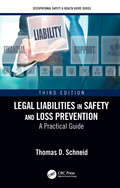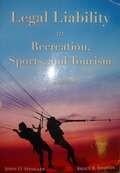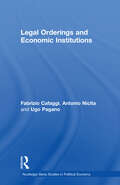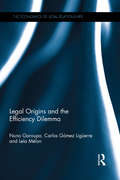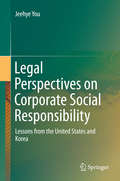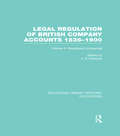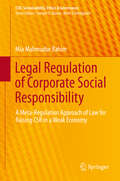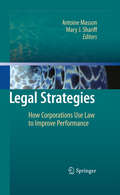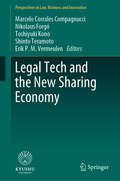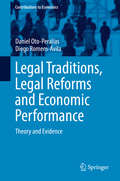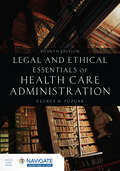- Table View
- List View
Legal Liabilities in Safety and Loss Prevention: A Practical Guide, Third Edition (Occupational Safety & Health Guide Series)
by Thomas D. SchneidThe goal of every safety professional and safety program is to be proactive and to identify problems while complying within safety guidelines. This book clarifies basic questions about legal liability, how to minimize, prevent, and identify legal risks. Appendices, case studies, and sample forms are included in this resource. The whole book will be revised due to the laws and regulations in the workplace changing. This revised edition will address all of the changes in the laws as well as providing guidance on how to achieve and maintain compliance. Features Covers methods to achieve and maintain compliance Includes new standards and regulations Discusses defense, rights, and responsibilities Provides a guide to professionals who are unfamiliar with reviewing, analyzing, and briefing a court decision Offers a new chapter on environmental and labor
Legal Liability in Recreation, Sports, & Tourism
by John O. SpenglerThe subject of legal liability conjures up thoughts of high costs, fiscal devasta¬tion, difficult legal language, attorneys, myriad legal papers, and time-consuming litigation. People generally fear those things that they don’t understand. The major purpose of this book is to provide recreation and sports students, practitioners, and professionals in the field with a body of knowledge that will help them manage the legal risks that are an everyday part of their lives. In the past, the field of recreation appeared to be sacrosanct when it came to people wanting to sue for damages. Prior to 50 years ago, when lawsuits were filed, the courts considered leisure pursuits as frivolous, and therefore counter to the good of society. The social structure and so-called “Protestant ethic” of the time called for hard work, not recreation. Only the very rich were privileged to have “leisure time.” In the past decades, the average citizens opportunity for leisure has increased significantly, and so has the extent of recreation, sport, and tourism litigation. Times have indeed changed!
Legal Loopholes: Credit Repair Tactics Exposed
by Charles DickensIt is estimated that over 80 million Americans are living with poor credit, and recent studies have shown that up to 79% of all credit reports contain errors. Use this recession-proof, guerilla-repair guide to quickly and legally repair your credit and improve your scores. Don't pay credit repair companies thousands of dollars; do it yourself, and be fast on your way to owning the car or house of your dreams. Remove accurate negative information. Boost your scores in as little as 72 hours. Establish credit fast and easy. Laws to stop creditors fast in their tracks. Secrets the credit bureaus don't want you to know. Remedy identity theft in 4 days.
Legal Orderings and Economic Institutions
by Ugo Pagano Antonio Nicita Fabrizio CafaggiThis book addresses the lively interaction between the disciplines of law and economics. The traditional boundaries of these two disciplines have somehow inhibited a full understanding of the functioning of and the evolution of economic and legal systems. It has often been the case that these boundaries have had to be reshaped, and sometimes abolis
Legal Origins and the Efficiency Dilemma (The Economics of Legal Relationships)
by Nuno Garoupa Lela Mélon Carlos Gómez LigüerreEconomists advise that the law should seek efficiency. More recently, it has been suggested that common law systems are more conducive of economic growth than code-based civil law systems. This book argues that there is no theory to support such statements and provides evidence that rejects a 'one-size-fits-all' approach. Both common law and civil law systems are reviewed to debunk the relationship between the efficiency of the common law hypothesis and the alleged inferiority of codified law systems. Legal Origins and the Efficiency Dilemma has six aims: explaining the efficiency hypothesis of the common law since Posner’s 1973 book; summarizing the legal origins theory in the context of economic growth; debunking their relationship; discussing the meaning of 'common law' and the problems with the efficiency hypothesis by comparing laws across English speaking jurisdictions; illustrating the shortcomings of the legal origins theory with a comparative law and economics analysis; and concluding there is no theory and evidence to support the economic superiority of common law systems. Based on previous pieces by the authors, this book expands their work by including new areas of analysis (such as trusts), detailing previous analysis (such as French law versus common law in the areas of contract, property and torts), and updating for recent developments in the academic discourse. This volume is of interest to academics and students who study microeconomics, comparative law and foundations of law, as well as legal policy analysts.
Legal Perspectives on Corporate Social Responsibility
by Jeehye YouThis book offers readers a comprehensive and in-depth legal analysis of corporate social responsibility (CSR) by examining the theoretical foundations of corporate governance and its legal mechanism in the United States and South Korea. Moreover, it proposes legislative blueprint for establishing the legal frameworks that might serve to legitimize and effectively implement CSR in general. Reflecting the zeitgeist of improved corporate accountability and transparency, the ongoing movement to enhance CSR has permeated entire sectors of society the world over. Despite the apparent ubiquity of CSR, the corporate laws of many countries remain relatively silent on the issue, omitting to include any explicit provision governing the concept. Partly in response to this lack of legislation, Korean corporate scholars, for example, have attempted to introduce American legal theories, systems and laws on CSR into Korea. Yet traditional Korean jurisprudence provides no defining foundation for CSR; indeed, the prevailing view in jurisprudence and scholarship passively resists instituting corporate responsibility into the law. In response to this jurisprudential and academic shortcoming, and as an example for other countries, this book provides a comprehensive guide to the relevant legislation and theory on CSR in Korean corporate law by employing a comparative study of the relevant American theories and laws. Proceeding from this analysis, the book then puts forward a legislative blueprint for establishing a foundation to legitimize and effectively implement CSR.
Legal Plunder: Households and Debt Collection in Late Medieval Europe
by Daniel Lord SmailAs a Europe grew rich in the Middle Ages, the well-made clothes, linens, and wares of households often substituted for hard currency. Pawnbrokers kept goods in circulation, and sergeants of the law marched into debtors' homes to seize belongings equal in value to debts owed. David Smail describes a material world on the cusp of modern capitalism.
Legal Principles in WTO Disputes
by Andrew D. MitchellPrinciples play a crucial role in any dispute settlement system, and the World Trade Organization (WTO) is no exception. However, WTO Panels and the Appellate Body have been too timid in using principles, sometimes avoiding their use when appropriate and at other times using them without fully acknowledging that they are doing so. Perhaps more worryingly, these bodies often fail to delve deeply enough into principles. They tend to overlook key questions such as the legal basis for using a given principle, whether the principle is being used in an interpretative manner or as applicable law, and the meaning of the principle in public international law. This book establishes a framework for addressing these questions. The use of such a framework should allay fears and misconceptions about the use of principles and ensure that they are used in a justifiable manner, improving the quality of dispute settlement in the WTO.
Legal Priorities in Air Transport
by Ruwantissa AbeyratneAgainst the backdrop of enormous technological strides, this book argues that the air transport industry must be constantly vigilant in its efforts to employ a legal regime that is applicable to the aeronautical and human aspects of the carriage by air of persons and goods. In this regard, safety and security are of the utmost importance, both in terms of safe air navigation and the preservation of human life. Although the International Civil Aviation Organization (ICAO) addresses legal issues through its Legal Committee, many emerging issues that urgently require attention lie outside the Committee’s purview. This book analyzes in detail the items being considered by ICAO’s Legal Committee, considers the legal nature of ICAO, and discusses whether or not ICAO’s scope should be extended. Since the limited issues currently addressed by ICAO do not reflect the rapidly changing realities of air transport, the book also covers a broad range of key issues outside the parameters set by ICAO, such as: the need to teach air law to a new generation of aviation professionals; combating cyber-crime and cyber-terrorism; the regulation of artificial intelligence; traveller identification; interference with air navigation; human trafficking; unruly passengers; climate change; air carrier liability for passenger death or injury; Remotely Piloted Aircraft Systems (drones); and the cabin crew and their legal implications.
Legal Protection of Intellectual Property
by Michael J. RobertsDescribes several classes of intellectual property: patents, copyrights, trade secrets, trademarks, and confidential business information. A rewritten version of an earlier note.
Legal Reform and Business Contracts in Developing Economies: Trust, Culture, and Law in Dakar (Cultural Diversity and Law)
by Julie PaquinThis book examines the prospects for business law reform to drive economic development in developing countries. It argues that, despite statements to the contrary, cultural factors and other local conditions in developing countries are not properly taken into account in current business law reform programs. Utilizing the city of Dakar as an example, this book investigates the consequences of this lack of fit between local needs and transplanted legal models by examining the potential and actual impact of the OHADA program of law reform on local business practices. Focusing on how managers make decisions and apply appropriate norms in routine business operations, the book documents how contractual disputes arise and are solved in Dakar and the role played by formal law in these processes. By examining imported law from the point of view of the end-users of legal reforms, the book reveals the complex relationship between formal law, local cultural norms and the activities of SMEs operating in developing economies, and calls for a reconsideration of current law and development theory as well as the role of contract law in business decisions. It will be relevant to all developing countries seeking to align their laws with ’best practice’ as identified by aid institutions.
Legal Regulation of British Company Accounts 1836-1900: Volume 2 (Routledge Library Editions: Accounting)
by J. R. EdwardsIn the UK today the form and content of accounts published by limited companies are closely regulated. In the 19th century the position was different: the popular view was that such matters were for private negotiation between owners and management. Nevertheless, there was a great deal of discussion of the need for regulations, which were actually imposed in a number of areas. This book provides readers with the essence of the many debates that took place, the conclusions reached and the action taken to regulate company accounts.
Legal Regulation of Corporate Social Responsibility
by Mia Mahmudur RahimEven though Corporate Social Responsibility (CSR) has become a widely accepted concept promoted by different stakeholders, business corporations' internal strategies, known as corporate self-regulation in most of the weak economies, respond poorly to this responsibility. Major laws relating to corporate regulation and responsibilities of these economies do not possess adequate ongoing influence to insist on corporate self-regulation to create a socially responsible corporate culture. This book describes how the laws relating to CSR could contribute to the inclusion of CSR principles at the core of the corporate self-regulation of these economies in general, without being intrusive in normal business practice. It formulates a meta-regulation approach to law, particularly by converging patterns of private ordering and state control in contemporary corporate law from the perspective of a weak economy. It proposes that this approach is suitable for alleviating regulators' limited access to information and expertise, inherent limitations of prescriptive rules, ensuring corporate commitment, and enhance the self-regulatory capacity of companies. This book describes various meta-regulation strategies for laws to link social values to economic incentives and disincentives, and to indirectly influence companies to incorporate CSR principles at the core of their self-regulation strategies. It investigates this phenomenon using Bangladesh as a case study.
Legal Risks in EU Law
by Emilia Mišćenić Aurélien RaccahThis book takes a completely new and innovative approach to analysing the development of EU law. Within the framework of different important areas of EU law, such as the internal market, consumer protection law, social law, investment law, environment law, migration law, legal translation and terminology, it examines the Union's approach to the regulation and management of legal risks. Over the years, the Union has come to a point where it is becoming increasingly difficult to justify its authority to regulate in various areas of law. In managing legal risks deriving from the diversity of Member States' laws, which create barriers to trade and hinder the Union's economy, the Union itself has actually produced new legal risks that now have to be addressed. This failure on the part of EU institutions to manage legal risks has contributed to legal uncertainty for actors operating on the internal market. This book intends to contribute to the Union's smoother functioning and continuing development by proposing effective concrete solutions for managing the legal risks distorting the development of various areas of EU law. It pursues an innovative and effective approach to identify legal risks, their causes at the EU level and their impacts on the functioning of the Union and its Member States. By presenting new approaches in this context, the first book on legal risk management in the EU will actively promote the improvement of the EU lawmaking process and the application of EU law in practice.
Legal Strategies
by Antoine Masson Mary J. ShariffFar from regarding the law as supreme, corporations approach law as an element of executive thought and action aimed at optimizing competitiveness. The objective of this book is to identify, explore and define corporate legal strategies that seek advantage in the opportunities revealed when the Law is perceived as a resource to be mobilized and aligned with the firm's business and economic agendas.
Legal Tech als Motor für die deutsche Wirtschaft: Einflussfaktor der digitalisierten Rechtsdienstleistung auf unternehmerisches Handeln
by Cathleen HesselbarthDie Globalisierung und die damit einhergehende Vernetzung der Märkte führt zu einem steigenden Wettbewerbsdruck für Unternehmen. Mit diesem Globalisierungseffekt geht ein Anstieg des juristischen Regelungsbedarfs einher, so dass die Unternehmen vor der Herausforderung stehen, die rechtlichen Blickwinkel sowohl in ihren strategischen als auch in ihren operativen Entscheidungen mit einzubeziehen. Gerade kleine und mittelständische Unternehmen haben strukturell bedingt meist keine eigene Rechtsabteilung oder juristisches Fachpersonal, auf die sie bei der Bearbeitung solcher Themen zurückgreifen können. Somit stehen Sie vor der Wahl, sich stetig rechtlich beraten zu lassen oder tragen das Risiko von Fehlern und möglichen Bußgeldern, was zu einer Verschlechterung der Wirtschaftlichkeit führen kann. Die Unternehmen übertragen damit den steigenden wirtschaftlichen Druck auch auf den juristischen Sektor, der seine Dienstleistungen immer schneller und kostengünstiger anbieten muss. Gerade der juristische Bereich ist durch die Ressource Mensch geprägt, deren Kapazitäten endlich sind. Dr. Cathleen Hesselbarth zeigt, dass Legal-Tech-Anwendungen eine sinnvolle Ergänzung darstellen können, um den Zwiespalt zwischen begrenzten Ressourcen und immer schneller benötigten Informationen zu verringern und schafft gleichzeitig eine fachübergreifende Verbindung zwischen Wirtschaft und Recht.
Legal Tech and the New Sharing Economy (Perspectives in Law, Business and Innovation)
by Toshiyuki Kono Nikolaus Forgó Marcelo Corrales Compagnucci Shinto Teramoto Erik P. M. VermeulenThe exponential growth of disruptive technology is changing our world. The development of cloud computing, big data, the internet of things, artificial intelligence, machine learning, deep learning, and other related autonomous systems, such as self-driving vehicles, have triggered the emergence of new products and services. These significant technological breakthroughs have opened the door to new economic models such as the sharing and platform-based economy. As a result, companies are becoming increasingly data- and algorithm-driven, coming to be more like “decentralized platforms”. New transaction or payment methods such as Bitcoin and Ethereum, based on trust-building systems using Blockchain, smart contracts, and other distributed ledger technology, also constitute an essential part of this new economic model. The sharing economy and digital platforms also include the everyday exchange of goods allowing individuals to commodify their surplus resources. Information and innovation technologies are used in order to then match these resources with existing demand in the market. Online platforms such as Airbnb, Uber, and Amazon reduce information asymmetry, increase the value of unused resources, and create new opportunities for collaboration and innovation. Moreover, the sharing economy is playing a major role in the transition from exclusive ownership of personal assets toward access-based exploitation of resources. The success of online matching platforms depends not only on the reduction of search costs but also on the trustworthiness of platform operators. From a legal perspective, the uncertainties triggered by the emergence of a new digital reality are particularly urgent. How should these tendencies be reflected in legal systems in each jurisdiction? This book collects a series of contributions by leading scholars in the newly emerging fields of sharing economy and Legal Tech. The aim of the book is to enrich legal debates on the social, economic, and political meaning of these cutting-edge technologies. The chapters presented in this edition attempt to answer some of these lingering questions from the perspective of diverse legal backgrounds.
Legal Tech und Legal Robots: Der Wandel im Rechtsmarkt durch neue Technologien und künstliche Intelligenz (essentials)
by Jens WagnerDieses Buch beschreibt und systematisiert die Einsatzbereiche von Legal Tech, einschlie#65533;lich k#65533;nstlicher Intelligenz, er#65533;rtert die Auswirkungen auf Kanzleien und Rechtsabteilungen und zeigt die damit einhergehenden strategischen sowie rechtlichen Implikationen auf. Der Autor geht sowohl auf die theoretischen M#65533;glichkeiten als auch auf aktuelle Anwendungsbeispiele aus der Praxis ein.
Legal Tech und Legal Robots: Der Wandel im Rechtswesen durch neue Technologien und Künstliche Intelligenz (Essentials Ser.)
by Jens WagnerDieses Buch gibt dem Leser sehr schnell einen tieferen Einblick in das Thema Legal Tech. Es beschreibt und systematisiert in kompakter und leicht verständlicher Form die Einsatzbereiche von Legal Tech und geht auf alle relevanten Aspekte rund um das Thema ein. Behandelt werden dabei sowohl der Kontext, in dem sich Legal Tech entwickelt hat, technische Konzepte und Funktionsweisen als auch die Auswirkungen, u.a. auf Kanzleien und Rechtsabteilungen, sowie damit einhergehende strategische und rechtliche Implikationen. Jens Wagner stellt sowohl theoretische Möglichkeiten als auch aktuelle Anwendungsbeispiele aus der Praxis dar.Für die zweite Auflage wurde das in erster Auflage als Springer essential erschienene Werk vollständig überarbeitet und erweitert. Neu sind insbesondere eigene Abschnitte zu Künstlicher Intelligenz, den Auswirkungen von Legal Tech auf Justiz und Verwaltung, innovativen Überlegungen im Bereich der Gesetzgebung sowie zum Thema Kollaboration. Das Buch wendet sich gleichermaßen sowohl an Juristen als auch an Informatiker, die an der Schnittstelle zum Recht arbeiten oder arbeiten wollen.
Legal Tech, Smart Contracts and Blockchain (Perspectives in Law, Business and Innovation)
by Helena Haapio Mark Fenwick Marcelo CorralesThere is a broad consensus amongst law firms and in-house legal departments that next generation “Legal Tech” – particularly in the form of Blockchain-based technologies and Smart Contracts – will have a profound impact on the future operations of all legal service providers. Legal Tech startups are already revolutionizing the legal industry by increasing the speed and efficiency of traditional legal services or replacing them altogether with new technologies. This on-going process of disruption within the legal profession offers significant opportunities for all business. However, it also poses a number of challenges for practitioners, trade associations, technology vendors, and regulators who often struggle to keep up with the technologies, resulting in a widening regulatory “gap.” Many uncertainties remain regarding the scope, direction, and effects of these new technologies and their integration with existing practices and legacy systems. Adding to the challenges is the growing need for easy-to-use contracting solutions, on the one hand, and for protecting the users of such solutions, on the other. To respond to the challenges and to provide better legal communications, systems, and services Legal Tech scholars and practitioners have found allies in the emerging field of Legal Design. This collection brings together leading scholars and practitioners working on these issues from diverse jurisdictions. The aim is to introduce Blockchain and Smart Contract technologies, and to examine their on-going impact on the legal profession, business and regulators.
Legal Time - Confidential Information for the Defense Attorney (Drew Davis)
by Katherine Coffman Christine L. Exley Joshua R. SchwartzsteinLegal Time is a two-party dynamic negotiation simulation. Students take the role of either the prosecution or the defense in a case that centers on a client who has been accused of spear-heading a conspiracy to commit wire fraud. This conflict-resolution scenario gives students the opportunity to see how their negotiations are influenced by important situational and behavioral factors - specifically, (i) fairness considerations and self-serving motives, (ii) time pressure, and (iii) learning from one's own experience and the experiences of others.
Legal Time Case
by Katherine Coffman Christine L. Exley Joshua R. SchwartzsteinLegal Time is a two-party dynamic negotiation simulation. Students take the role of either the prosecution or the defense in a case that centers on a client who has been accused of spear-heading a conspiracy to commit wire fraud. This conflict-resolution scenario gives students the opportunity to see how their negotiations are influenced by important situational and behavioral factors - specifically, (i) fairness considerations and self-serving motives, (ii) time pressure, and (iii) learning from one's own experience and the experiences of others.
Legal Traditions, Legal Reforms and Economic Performance
by Diego Romero-Ávila Daniel Oto-PeralíasThis book investigates whether legal reforms intended to create a market-friendly regulatory business environment have a positive impact on economic and financial outcomes. After conducting a critical review of the legal origins literature, the authors first analyze the evolution of legal rules and regulations during the last decade (2006-2014). For that purpose, the book uses legal/regulatory indicators from the World Bank's Doing Business Project (2015). The findings indicate that countries have actively reformed their legal systems during this period, particularly French civil law countries. A process of convergence in the evolution of legal rules and regulations is observed: countries starting in 2006 in a lower position have improved more than countries with better initial scores. Also, French civil law countries have reformed their legal systems to a larger extent than common law countries and, consequently, have improved more in the majority of the Doing Business indicators used. Second, the authors estimate fixed-effects panel regressions to analyze the relationship between changes in legal rules and regulations and changes in the real economy. The findings point to a lack of systematic effects of legal rules and regulations on economic and financial outcomes. This result stands in contrast to the widespread belief that reforms aiming to strengthen investor and creditor rights (and other market-friendly policies) systematically lead to better economic and financial outcomes.
Legal and Economic Principles of World Trade Law
by Petros C. Mavroidis Henrik HornThe World Trade Organization (WTO) Agreement covers international commerce in goods and services including measures that directly affect trade, such as import tariffs and quotas, and almost any type of internal measure with an impact on trade. Legal and Economic Principles of World Trade Law contributes to the analysis of the texts of World Trade Law in law and economics, reporting work done to identify improvements to the interpretation of the Agreement. It starts with background studies, the first summarizes The Genesis of the GATT, which highlights the negotiating history of the GATT 1947-1948; the second introduces the economics of trade agreements. These are followed by two main studies. The first, authored by Bagwell, Staiger, and Sykes discusses legal and economic aspects of the GATT regulation of border policy instruments, such as import tariffs and import quotas. The second, written by Grossman, Horn, and Mavroidis, focuses on the core provision for the regulation of domestic policy instruments – the National Treatment principles in Art. III GATT.
Legal and Ethical Essentials of Health Care Administration
by George D. PozgarOffering a comprehensive and updated review of both health law and ethics, Legal and Ethical Essentials of Health Care Administration, Fourth Edition provides the reader with the necessary knowledge to become conversant with both legal and ethical issues pertinent to the healthcare profession. Using reader-friendly language, the book presents actual court cases, state and federal statues, and common-law principles to help the student understand the practical application of the concepts learned. The author includes a broad discussion of the legal system, including the sources of law and government organization as well as basic reviews of tort law, criminal issues, contracts, civil procedure and trial practice, and a wide range of real-life legal and ethical dilemmas that caregivers have faced as they wound their way through the courts.
